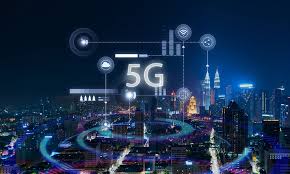The rollout of 5G technology is one of the most anticipated developments in the tech world, promising to revolutionize the way we connect to the internet and interact with devices. As we move into an increasingly connected world, 5G is poised to change not only how we communicate but also how industries operate, how businesses function, and how innovations like autonomous vehicles and smart cities take shape. But what exactly is 5G, and how will it impact our lives in the years ahead?
What is 5G?
5G stands for fifth-generation wireless technology. It is the successor to the current 4G LTE networks and promises faster speeds, lower latency, and more reliable connectivity. While 4G brought us mobile internet speeds fast enough to stream HD video and browse the web seamlessly, 5G is set to go several steps further. It will not only improve speed and efficiency but also enable new use cases that were previously impossible or impractical with earlier generations of wireless networks.
At its core, 5G is built to meet the increasing demands of data-intensive applications and the growing number of connected devices. With ultra-fast speeds, instant communication, and reliable connections, 5G will unlock opportunities in various industries, from healthcare and manufacturing to entertainment and transportation.
Key Features of 5G Technology
To understand how 5G will change the mobile landscape, it’s important to break down its key features:
- Blazing Fast Speeds:
5G promises download speeds up to 100 times faster than 4G. This means that tasks like downloading large files, streaming ultra-high-definition (UHD) video, and online gaming will be almost instantaneous. The increased speed will also make it possible for more people to connect to the network simultaneously without experiencing slowdowns, even in densely populated areas. - Ultra-Low Latency:
Latency refers to the delay in communication between devices over a network. 5G is expected to reduce latency to one millisecond—a drastic improvement over the 30-50 milliseconds typical of 4G. This reduction in lag will have a profound impact on applications requiring real-time data processing, such as autonomous driving, remote surgery, and real-time gaming. - Massive Connectivity:
With the growing use of Internet of Things (IoT) devices, 5G will support massive numbers of connections simultaneously. Estimates suggest that 5G networks will be able to handle up to 1 million devices per square kilometer, which is essential as smart cities, industrial sensors, and consumer gadgets continue to proliferate. - Increased Reliability:
5G is designed to be highly reliable, ensuring a consistent and stable connection even in challenging environments. This is particularly important for critical applications like remote healthcare, emergency response systems, and industrial automation, where downtime or poor connectivity could have significant consequences.
How 5G Will Impact Different Industries
While 5G’s primary benefit for most consumers will be faster mobile internet, its true potential lies in its ability to transform industries by enabling new technologies and business models. Let’s take a closer look at how 5G is expected to impact key sectors.
1. Healthcare
5G will play a crucial role in advancing healthcare technologies. With its ultra-low latency and high reliability, it will enable remote surgery and telemedicine to become more mainstream. Surgeons could use robotic tools to perform operations from miles away with real-time precision, thanks to 5G’s ability to deliver near-instantaneous communication between devices.
In addition, 5G’s enhanced data speeds and capacity will make it easier to transmit large medical files, such as high-resolution images or live video streams, making consultations and diagnoses more efficient. Wearable health devices will also benefit, as 5G will enable continuous, real-time monitoring and more immediate medical responses to patients in need.
2. Transportation and Autonomous Vehicles
One of the most exciting applications of 5G is its potential to transform the transportation industry, particularly with autonomous vehicles. For self-driving cars to function safely and efficiently, they must be able to communicate in real-time with other vehicles, infrastructure, and sensors. 5G’s ultra-low latency and fast speeds will ensure this real-time communication, reducing the risk of accidents and improving traffic management.
5G will also play a key role in smart cities, where it can connect traffic lights, street signs, and parking systems. This level of connectivity will help improve traffic flow, reduce congestion, and minimize environmental impact.
3. Manufacturing and Industry 4.0
The manufacturing sector will undergo a massive transformation with the advent of 5G, leading to the era of Industry 4.0. 5G will enable smart factories where machines and devices are connected through the Internet of Things (IoT), exchanging real-time data to optimize production lines and increase efficiency.
For example, manufacturing robots will be able to work more effectively with real-time feedback and more precise coordination, reducing downtime and increasing productivity. Augmented reality (AR) and virtual reality (VR) technologies will also become more widely used for training and maintenance, with 5G providing the necessary bandwidth to run these applications seamlessly.
4. Entertainment and Media
The entertainment industry will benefit from 5G in several ways, especially in the realms of video streaming and gaming. With 5G’s fast speeds, consumers will be able to stream 4K and 8K video content on their mobile devices without any buffering or delays. Live sports broadcasts, concerts, and other real-time events will be delivered in unprecedented quality, creating new opportunities for immersive experiences.
Gaming will also be transformed, with cloud gaming becoming more popular. Gamers will no longer need powerful hardware to run graphics-intensive games, as 5G will allow them to stream games from remote servers with minimal lag, offering an experience similar to gaming on a high-end console or PC.
5. Smart Cities and IoT
5G will be a game-changer for the development of smart cities. Its ability to connect millions of IoT devices will enable more efficient management of urban infrastructure, including energy grids, traffic management, waste management, and public safety. Smart sensors embedded in everything from streetlights to trash cans will be able to send real-time data to city planners, helping to create more sustainable and efficient urban environments.
This will also benefit environmental monitoring, as 5G will allow for constant tracking of air quality, water levels, and energy consumption. In turn, this will allow cities to make data-driven decisions to improve the quality of life for their residents.
Challenges and Considerations
While 5G holds enormous promise, there are still challenges to address before it becomes fully ubiquitous. Infrastructure development is one of the primary hurdles, as 5G requires a dense network of small cells to provide the necessary coverage. This means cities and rural areas alike will need significant investments in new infrastructure to fully realize the potential of 5G.
Additionally, security and privacy concerns will need to be addressed as more devices become interconnected and reliant on 5G networks. Ensuring that these networks are secure from cyber threats will be crucial for maintaining trust in the technology.
The Road Ahead
As 5G networks continue to expand and evolve, we will see a range of new applications and business models emerge. The technology’s impact will go far beyond faster download speeds and better mobile connectivity—it will lay the groundwork for entirely new industries and solutions. From revolutionizing healthcare and transportation to powering smart cities and enhancing entertainment, 5G will be the driving force behind many of the innovations we can expect in the coming decade.
While we are still in the early stages of 5G rollout, its full potential is on the horizon. As this technology continues to mature, it will undoubtedly change the way we live, work, and interact with the world.
This article explains what 5G is, its key features, how it will impact various industries, and the challenges that lie ahead. Let me know if you would like to adjust any details or expand on a specific section!


